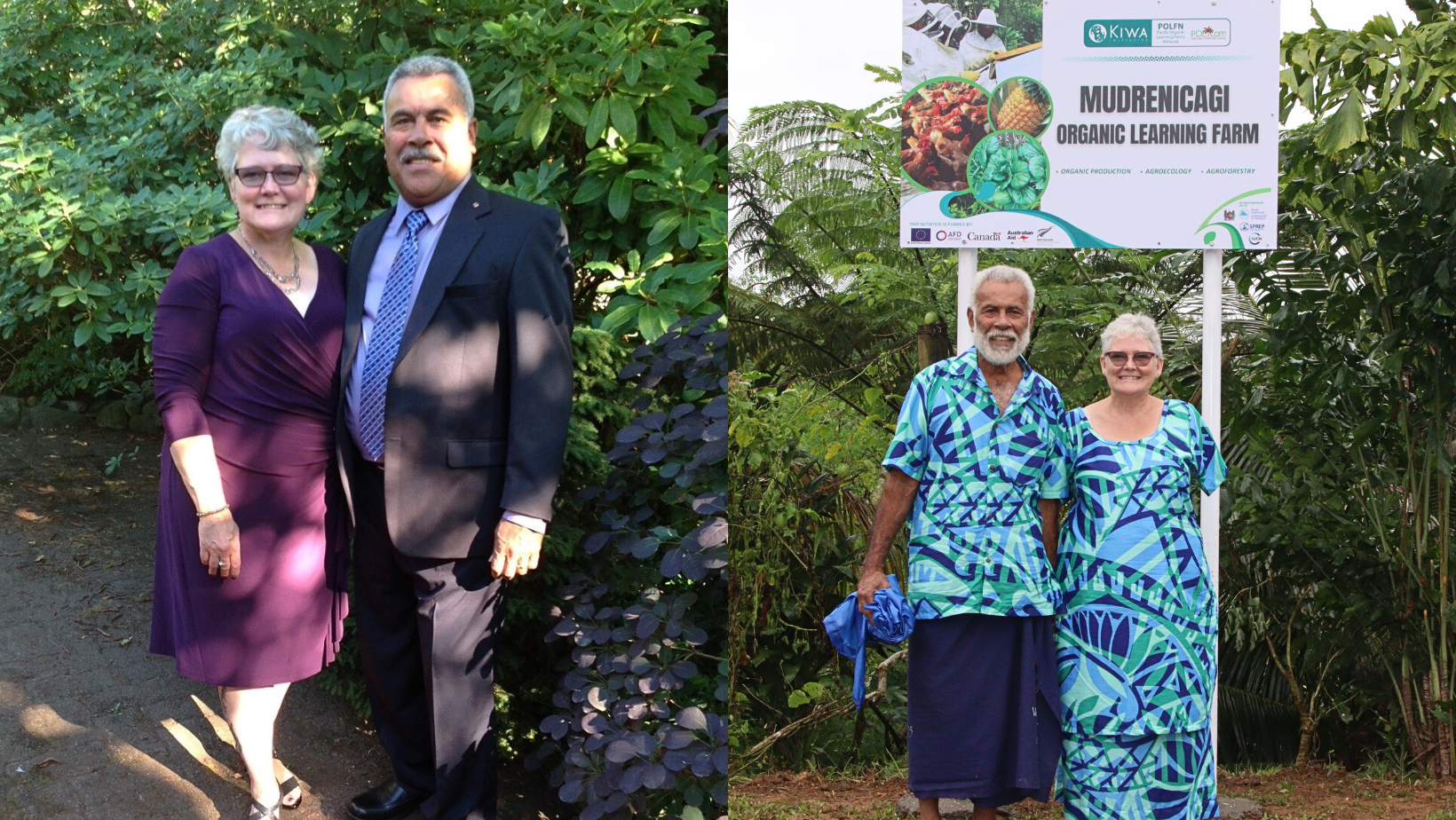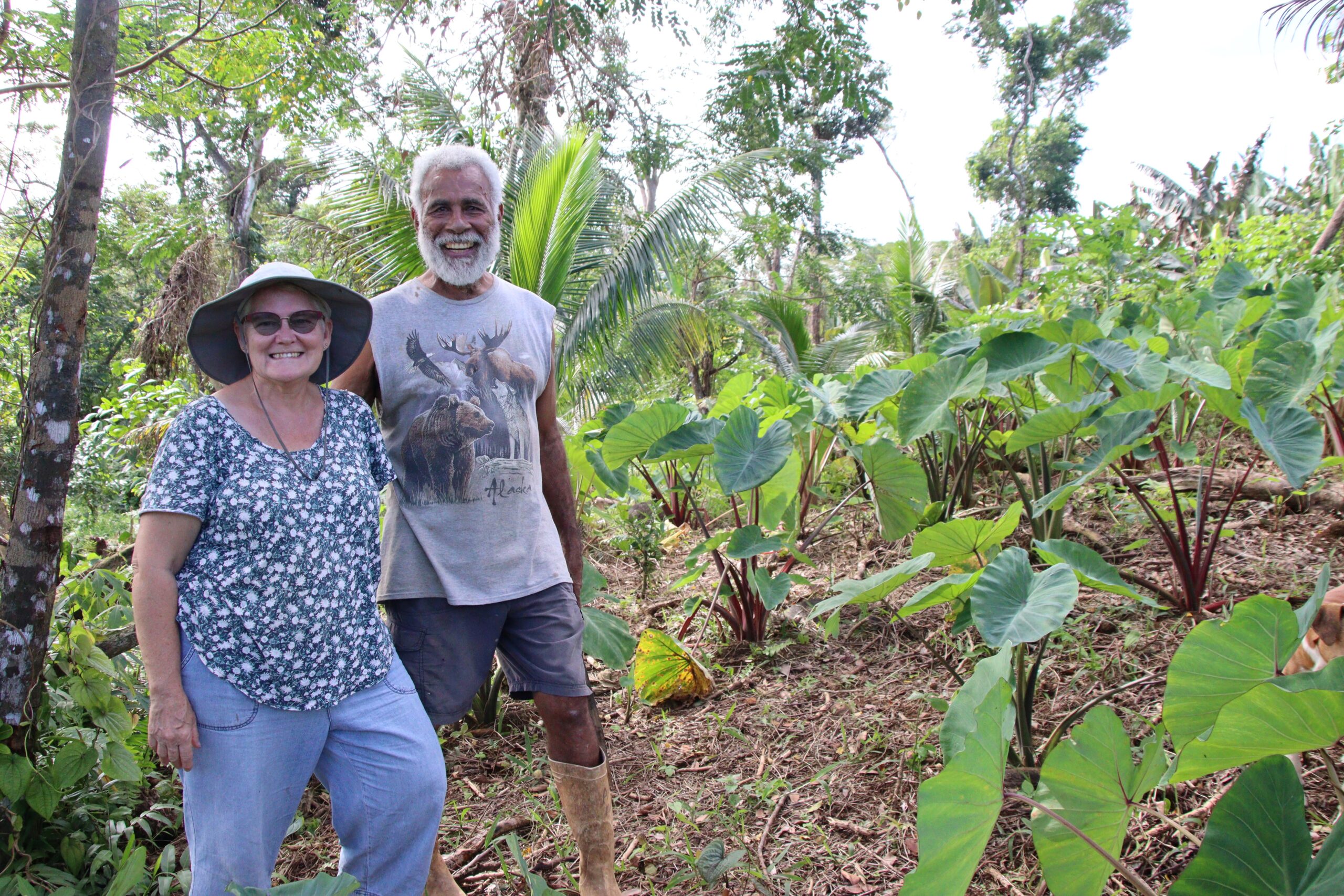As a young boy growing up in the lush vegetation of Waidranudranu in the province of Bua, Fiji, Arthur Mills experienced a childhood much like other Fijian boys during the 1960s and ’70s. His days were spent accompanying his father on their family farm – a haven where they cultivated copra and rootcrop. In those days, farming didn’t heavily depend on fertilisers or pesticides as it does today; all a farmer needed was their trusty spade and fork, a cane knife and an understanding of traditional farming methods that had been passed down through generations.
Today at age 65, after 30years abroad, Arthur is living his dream and continuing the legacy of his forefathers in establishing an organic farm with his wife, Karen. Into the first two years of purchasing their farmland of over 93 acres, the Mills hacked a bit of the Mudrenicagi tropical rainforest jungle, cleared roads and land, built a base camp, planted taro and cassava, 500 Yasi trees, survived a category 5 Tropical Cyclone Winston, built their main two-story house, planted lots of pineapple and banana plants, started a small poultry business, became beekeepers and built a market garden.
It’s no wonder that Arthur is arguably one of the most physically fit 65 year olds in Fiji. Arthur keeps himself healthy with an active lifestyle, farming organic yams, taro, fruits and vegetables, kava, managing beehives, growing coffee beans, making and applying organic pesticides and running trainings with neighbouring communities. While Arthur navigates his present life radiating health and vibrancy, it’s a vivid departure from when he was 40 – 50 years old. After spending eighteen committed years in an office environment, a wake-up call from his doctor shook him with the risk of a serious illness.
“He mentioned a couple of health issues. He said that diabetes was creeping up on me, my blood was really sweet (high blood sugar) and I was overweight. I spent eighteen years in front of a computer, and I know that contributed to my poor health.” – Arthur Mills, Mudrenicagi Organic Learning Farm, Fiji.

Arthur struggled with weight gain, pre-diabetes, rising blood pressure, and knew he would lead a difficult life into his senior years if he did not get a handle on a healthier lifestyle and eating habits. This past scare now merely underscores how far he has triumphed in his journey to wellness. Since switching to organic foods on their Mudrenicagi organic farm in 2014, Arthur and Karen attest to the amazing health benefits of organic foods, and have embraced a remarkable health transformation. Arthur now weighs a healthy 20kg’s less than when he first moved to Fiji, his blood glucose levels are well balanced, he is able to be more physically active with more energy on a day to day, and overall enjoys his second chance at a healthy full life.
Now nine years into cultivating their organic farm, the Mills claim there are obvious differences in the growth and flavours of organic vegetables and crops compared to those grown conventionally. They noticed on multiple instances that certain leafy vegetables from the market emit an unusual scent when they have been subjected to excessive fertiliser use by conventional farmers.
“The end results is that the fruit and vegetables we’re growing have so much more flavour than what we buy in the market. Once people get a taste of what something organic tastes like versus when chemicals and sprays are added, there is a notable difference and people prefer organic” – Karen Mills, Mudrenicagi Organic Learning Farm Centre, Fiji
Karen claims that organic farming has unique characteristics that set it apart from other agricultural practices. One of these distinct facets is the extensive use of inter-cropping, which involves growing different types of crops together in the same area. This method helps promote biodiversity, nutrient cycling, and pest control. Organic farming prioritizes education in natural cultivation techniques, teaching farmers about eco-friendly pest management, crop rotation, and soil management. Techniques like ‘chop and drop,’ where cut plant material enriches the soil as a natural mulch, alongside utilizing organic materials for mulching to preserve soil moisture, suppress weeds, and boost fertility, are integral practices.
In mid-2023, the Mills put their hands up to become an organic learning farm centre under the Pacific Organic Learning Farms Network (POLFN) Project implemented by POETCom at the Pacific Community (SPC). In partnership with Fiji’s Ministry of Agriculture and Waterways, POETCom launched the Mudrenicagi organic learning farm centre with the goal to develop capacities of 40 – 50 small-scale farmers keen to learn organic farming, organic value-added products, farm planning, business planning as well as access to Group Organic Certification.

The POLFN Project is supported by the Kiwa Initiative, which is a multi-donor organization funded by the European Union in the Pacific, the French Development Agency, Canadian International Development Agency, Australian Government Department of Foreign Affairs and Trade, New Zealand Ministry of Foreign Affairs and Trade, with its implementing partners in the region, SPC, South Pacific Regional Environment Programme (SPREP) and the International Union for Conservation of Nature (IUCN).